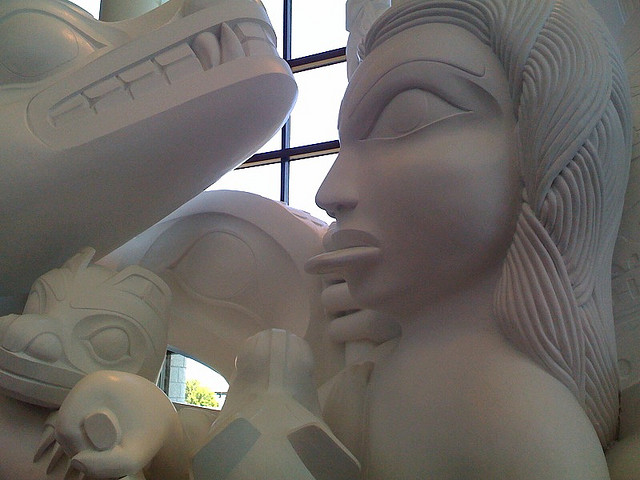I have always been struck by the natural beauty of this earth. I grew up admiring rivers and the northern lights. I’ve forever been in awe of the quiet elegance of snow-covered trees. I was raised in a place where the landscape takes breath away and leaves people speechless.
Yet, being raised in a place where I was encouraged to admire the beauty of the land, I was never encouraged to admire the beauty of myself. Instead, through insidious media and an overwhelming support of white, Western beauty norms that favour slender white women, I was raised to chase an impossible means to an end. I have inherited many beautiful things from my mother, and one of those things was the impossibility of ever being able to fit into these beauty norms. Being born short, stocky, and squinty doesn’t lend itself to really seeing oneself as a beautiful person. I still struggle with this.
This struggle to accept myself is has also been tied so tightly to being Métis. If only I had two white parents, if only this, if only that… I wouldn’t be this. I fought with myself intensely throughout my adolescence. I had convinced myself and been convinced by others that my indigeneity was a downfall, it was something that I should be ashamed of, it was a factor in my perceived ugliness. Being mixed, I felt I was further caught in a paradigm — I wasn’t Native enough to be beautiful or white enough to be beautiful. This arbitrary level of beauty I kept holding myself to, that still permeates the back of my mind on days where I don’t feel strong enough to fight it off, is deeply ingrained in colonization and acts as a perpetuation of an unhealthy colonial mentality.
I’ve been wondering how to fix this thinking. How do I make loving myself a normal part of my decolonial praxis? For me, decolonization begins and ends with the land, everything is tied to land — how to treat each other, how to organize politically, how we sustain ourselves as Indigenous peoples is tied to the land. As such, the love I have for myself as a Métis woman is tied to the land as well. My curves are grassy knolls, my stretch marks are ravines, bruises are the northern lights, and my veins are rivers: I am beautiful like this land I come from.
This land is exquisite and so are we. If we can take the time to appreciate sunsets and mountain peaks, we can take the time to look in the mirror every morning and appreciate the curves of our bodies. We need to, as Indigenous women, practice radical self-love. We need to love ourselves in the same way we love this land. Our bodies are deeply flawed, imperfect, and breathtaking — just like this earth. Our bodies are sovereign territory like our Nations, our bodies are homes we have to live in and with. We are often displaced, displeased, and dismayed with where we come from, but we love it — deeply and intrinsically. Loving ourselves is not something we can just do, it’s work. It’s decolonial work and it is work we can’t do by ourselves.
I struggle everyday to love myself. I know we all do. But, when it gets are hard and the days happen where I can barely even look at myself, I remember that we exist because of the love of our ancestors. Our bodies are compromised of stories older than time, our blood and bones are of this land. Even if I have a day where I can’t see the beauty in myself, I still know that as imperfect as I am, I am here and supported by those who loved me into existence. Within this insurmountable accumulation of love, for land and people, I find enough left for me to begin to love myself again.
Image: Flickr/Nadine Wills



